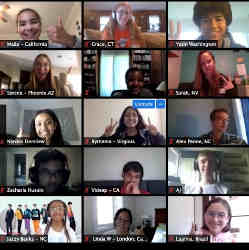
Quantum information science (QIS) has been an intriguing peripheral topic for much of the computing and engineering community for some time, but that is about to change. Government funding agencies, university researchers, and technology industry heavyweights are planting the seeds for a workforce conversant with a wide range of QIS-applicable skills. While the field has hitherto been the province of physics researchers with doctorates, the nascent quantum industry is now calling for higher education to begin preparing a quantum workforce with a wider and less specialized range of technical skills.
"I think some of the initial thinking was how to scale up masters level programs and maybe even scale up Ph.D. education," said Ben Zwickl, a professor in the school of physics and astronomy at the Rochester Institute of Technology (RIT). "I think there was a looking past of the enormous numbers of engineers and computer scientists who could benefit from more introductory level courses."
Zwickl recently co-authored, with University of Colorado researchers Michael Fox and Heather Lewandowski, a qualitative survey published in Physical Review Physics Education Research. The survey asked 21 quantum industry enterprises specifically what knowledge they wanted universities to provide those interested in working in QIS. The three said their work is just one paper in a rapidly growing foundational collaboration. In particular, Lewandowski said, the National Quantum Initiative Act of 2018 jump-started the national QIS effort.
Coincidental to the publication of the trio's study, two other announcements signaled the readiness of both higher education and industry to put quantum into the mainstream:
- The National Science Foundation Convergence Accelerator launched QuSTEAM (Quantum Information Science, Technology, Engineering, Arts and Mathematics) with a $700,000 first-stage research grant to faculty at five universities. The first-stage research will include focus groups and surveys of academic, industrial, and national lab stakeholders to determine the scientific and engineering practices that will be required of the future quantum smart workforce and begin to develop a curriculum intended to provide a framework for quantum information sciences (QIS) education that can be implemented on a national scale.
- IBM announced its first IBM Quantum education and research initiative for Historically Black Colleges and Universities (HBCU), aimed at driving a diverse and inclusive quantum workforce. The IBM-HBCU Quantum Center will offer access to its quantum computers, as well as collaboration on academic, education, and community outreach programs. The initial partnership included 13 institutions, with plans to add 12 more shortly thereafter.
Quantum, classical computing need to co-exist
Fox, Zwickl, and Lewandowski plainly state the current status of the relationship between academia and the quantum industry in their research: "In all of the discussions between industry and academia, and within academia, many more questions than answers have arisen. Therefore, before higher-education institutions implement new courses and programs to develop the workforce pipeline, one important question to answer is what are the skills that are needed?"
Said Zwicki, "There is a pretty well-defined core of people in R&D who are really advancing the technology development, but then as stuff gets to become more commercialized and you think about scaling up to manufacturing and applying it in lots of different places, all of a sudden you have a vastly growing ecosystem of people who need to know a little bit of quantum."
Though the quantum industry is still at a juncture where the respondents to the researchers' queries placed emphasis on those with physics Ph.D.'s, they also said they prize traditional computer science skills: 90% stated they placed emphasis on coding skills and experience in using statistical methods for data analysis, and Lewandowski said such expertise in industrial-scale development is usually missing from physicists with a more research-oriented focus.
"One of the most common referenced skills was classical coding, not necessarily coding for quantum computers," Lewandowski said. "And I think it addresses the ad hoc nature in which physicists and possibly some engineers learn coding and code; in particular, how to properly collaboratively code. They may write little bits of code here and there, but to actually have understanding of a significant software development cycle and collaborative coding is really missing from traditional engineering and physics disciplines. And that is where computer scientists really excel."
What the industry is looking for, the trio discovered, was to introduce classically oriented computer scientists to QIS broadly, rather than expect post-graduate quantum specialization.
"The idea is to have those folks become sort of quantum-conversant, that they may have one or two semesters in an intro QIS course," Lewandowski said. "They don't need a whole master's program in addition to their own computer science credentials, but they need to be able to work on these interdisciplinary teams and talk the language of this, but bringing their classical coding skills to apply to these problems. That is something we do need from computer science."
Lewandowski and her colleagues at the University of Colorado have already started addressing the industry's expressed wishes: an introduction to quantum computing class has been developed jointly by that university's computer science and physics faculties, and is taught by both departments. Prerequisites for the course emphasize linear algebra, but Lewandowski said there are no physics prerequisites. Zwickl said RIT is currently developing a similar course, and expects it to be running in about 18 months.
"Physics departments have a had a long tradition of featuring a modern physics course around the sophomore level some engineering students take, after you take mechanics and electricity and magnetism, but it's not really modern compared to quantum technology," Zwickl said. "So there's a chance to sort of reboot, in terms of offering these new contemporary topics."
Kayla Lee, IBM Quantum product manager of community partnerships and growth and identity, said the nascent state of the industry is giving both sides of the industry-academia relationship a chance to establish baseline knowledge and pipelines of a knowledgeable and diverse workforce with no existing template.
"In ways other fields have had to play catch up, we are actually all at the beginning," said Lee, who earned her doctorate in biology. "I get calls every day where people ask how it applies to biology. The finance people want to know how it applies to their risk analyses. And I think now more than ever the field is open and friendly and welcoming of the fact that we all come from different backgrounds, and that will help the field."
Lee is also convinced the IBM-HBCU partnership will encourage more than disciplinary diversity.
"I think what we are doing is slightly different," Lee said. "There is this industry push to think about what the quantum-smart workforce is, but when it comes to asking questions like how to make the field more representative, how to ensure there are diverse lived experiences across race, gender and socioeconomic status, I don't think that strategy has been thought of in a way that looks any different from what we have already done with existing fields. We already know how the current technology landscape looks."
Lee said the quantum center's board has been assembled to reflect people across the spectrum of career stages; the intent is to help advance talent and provide mutual benefit to those using the center, from the undergraduate level to industry veterans, with an emphasis on promoting research. "We just finished a call for proposals and I was really excited to see a lot of our younger faculty, who have been at their schools for one or two years, submitted the strongest proposals. For us, that's a great start at how we can continue to develop their research and build bridges to the quantum community."
K-12 Not Quantum-Ready
While universities and some of their industrial partners appear poised to begin addressing the quantum curriculum seriously, there is still plenty of need to emphasize classical computer science first in K-12 classrooms, according to Jake Baskin, executive director of the Computer Science Teachers Association.
"We've made tremendous progress in the last seven years in the U.S. in growing awareness around the importance of computer science in K-12 schools and the number of schools offering it," Baskin said. "But the truth is, the majority of high schools in the country still don't offer a single computer science class. So when we start talking about quantum or new extensions, I think it's important we remember we are still early in making computer science foundational for all students. It's essential we continue that project, then build upon it with all the extensions that come next."
As computer science and physics professors begin developing collaborative curricula at the university level, Baskin said funding and emphasis at the elementary and secondary levels needs to be basic. Computer science teachers at those schools are disproportionately trained in other subjects. "What we hear from our membership is a consistent call for continued support in funding professional development on the foundational concepts of computer science," he said. "And, given the challenges facing schools, I think quantum is something that is being talked about around education, but is not a hot topic with teachers in the classroom right now."
Even at the university level, Zwickl said, quantum's nascent status may portend relatively less emphasis for some time. "There are fields that are much more enormous, like cybersecurity," he said. "So when you are thinking about strategic large-scale workforce initiatives, there are STEM domains which are just as hot and emerging, but vastly larger and worthy of the systematic program development."
Lewandowski said the next decade should provide a clearer picture of quantum's relative importance to the rest of information science.
"It's unclear where quantum is going to go in terms of its impact," she said. "I think there's probably a pretty bright future for it, but over the next five to 10 years we'll really see how fast that growth is."
Gregory Goth is an Oakville, CT-based writer who specializes in science and technology.




Join the Discussion (0)
Become a Member or Sign In to Post a Comment